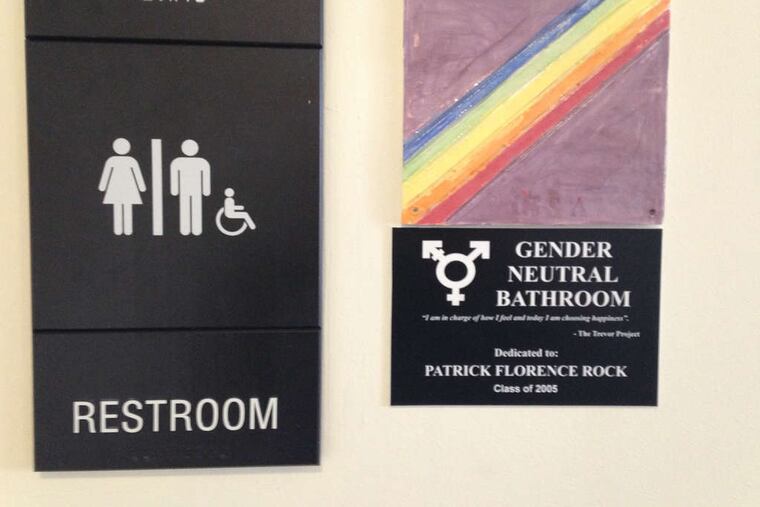Opening a bathroom door to make all feel welcome
When Patrick Rock became the first transgender student to come out at his high school, he worried about being rejected and harassed. He never dreamed he would return a decade later to be honored for his act of terrifying honesty.

When Patrick Rock became the first transgender student to come out at his high school, he worried about being rejected and harassed. He never dreamed he would return a decade later to be honored for his act of terrifying honesty.
In March, Jack M. Barrack Hebrew Academy in Bryn Mawr dedicated a gender-neutral bathroom to Rock, Class of 2005. While the single-stall facility can be used by anyone in the school, it was inspired by a talk Rock gave at Barrack a few years ago. Asked how to make the school a more welcoming place for transgender students, he suggested providing a nonpublic bathroom.
"They're places that everybody has to go, but teachers aren't supervising them and that makes them very different from anywhere else in the school," said Rock in a phone interview from California, where is working on a doctorate at the University of California, Los Angeles. "There have been times when I've walked into a bathroom and someone's said, 'You don't belong here.' More likely, people have looked very uncomfortable and stared at me as they've tried to figure out what my gender is."
A transgender person is one who identifies with a gender that does not match his or her biological sex. Rock, 27, identifies as a man. His mother, Andrea, has taught at Barrack for 30 years. She said she knew adolescence presented challenges for Rock, but it presents challenges for most students. She described how he publicly came out as a lesbian in 10th grade, told his family and close friends he was trans in 11th grade, then filled in the rest of the school in 12th grade when students were sharing journal entries in English class.
"I was then and even more now so moved by the support that he got within this community," Andrea Rock said. "I know the community. I know the human quality. We all try to live together as a community. People have related to Patrick as an individual human being deserving of respect and inclusion."
The idea for a dedicated bathroom came from the student body soon after Rock spoke at the school. Rachel Kolman and Ali Gorson-Morrow were freshmen then. Today, they are 17-year-old juniors and copresidents of the school's Gay Straight Alliance. They pushed the drive for the bathroom, which had lagged, forward. It wasn't a hard decision, to make a small change that would make a big difference to some students, they said. Their school, they said, was about inclusion.
"Some people at our school say, 'Why do you need GSA?'" Gorson-Morrow laughed. "People are so accepting."
But bathroom politics are an issue elsewhere. In Kentucky, a bill that would ban transgender students from using the bathroom of their gender identity was approved last month by the state Senate's education committee.
At Barrack, after the gender-neutral bathroom was dedicated, Head of School Sharon Levin said two parents contacted her with questions, but have not complained since. In a letter to parents sent two weeks after the dedication, she said the initiative underscored the school's commitment to building a community where all people are valued and welcomed.
"The buzz has been so positive, 'I'm so proud to have my child at this school' or 'What a great thing.' This shows tolerance, respect, acceptance, and that's what I think we're about here," Levin said. "I am so proud that this was a student-driven project. Part of what we're trying to teach is: You matter and you are powerful. Go out and do good, powerful things to make the world a better place."
Any transition is difficult. Still, Rock has been luckier than other transgender people. His school, clearly, supports him. His family, too, has always made it clear that he is loved. He remembers his mother's first reaction as "I care about you and I want you to be happy." Not all families are so accepting, he said, noting, "I sometimes bring home friends who are trans and don't have parents so my parents can give some surrogacy."
But these are not simple issues. Even those with the best intentions will make mistakes. When I started to write this column, I crafted a beginning I thought was pretty good, then sent it to Rock out of curiosity: Would this be offensive to you? His response was a resounding yes.
I had wanted to include Rock's birth name. That was a mistake, he wrote, noting "as a general rule, trans people consider it deeply offensive to publish their birth names. Except when a trans person explicitly asks you to do so, you really shouldn't even consider it."
What I had written also implied he'd graduated as a female and returned years later to speak to students as a male. That was incorrect, he said. He'd identified as a man before graduation and, in terms of biology, "it's inaccurate to suggest that I was female then but am male now - I still have XX chromosomes, for instance. . . . If you're going to talk about my transition, I'd rather you talk about me transitioning from identifying as a woman to identifying as a man, rather than from 'female' to 'male,' which centers attention on my genitalia."
He suggested a few different ways to start this story and I took his thoughtful advice. I did not share any other part of the column with him before publication. I hope I haven't written anything that will offend him, but I'm sure he'll let me know afterward. If so, I'll try to get it right in the future.